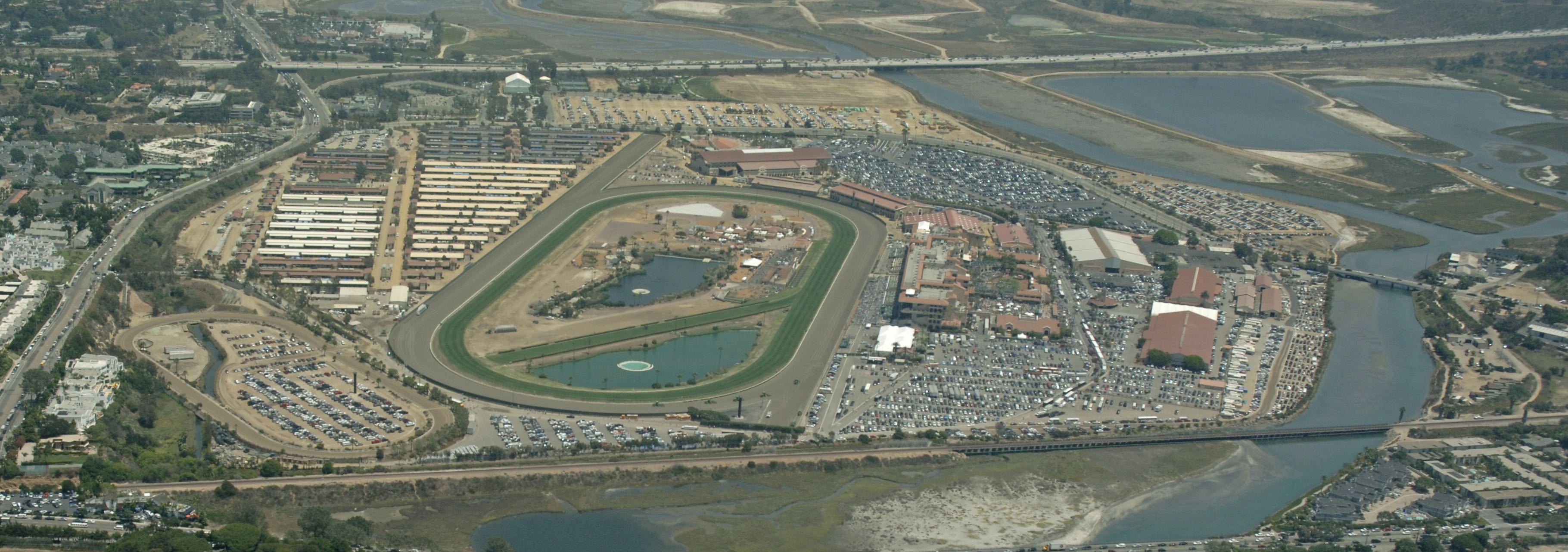
The recycling of water, a matter of high importance as the state of California navigates its way through a fourth consecutive year of drought conditions, is a cause that the Del Mar Thoroughbred Club has embraced and expanded on for more than two decades.
Working hand-in-glove with the 22nd District Agricultural Association – the agency that runs the state fairgrounds on which DMTC’s famed Del Mar racetrack sits -- track officials have transitioned from potable (drinkable) to recycled water in virtually every major area of usage possible – for its main track and turf course, for its infield lakes and its infield landscaping on the 350-acre fairgrounds. Additionally, a native wetlands restoration project ongoing adjacent to the fairgrounds also currently uses its reclaimed water.
DMTC and the 22nd DAA contract with the San Elijo Joint Powers Authority in nearby Cardiff for its recycled water, drawing down approximately 160 acre feet this past year, the third-most usage of its kind among all facilities supplied by the Authority in northern San Diego County. An acre foot equals 43,560 cubic feet and is equivalent to 325,851 gallons of water.
Besides two major race meets, the Del Mar Fairgrounds, which sits alongside the Pacific Ocean in the town of Del Mar about 20 miles north of San Diego, annually presents one of the nation’s largest and most successful Fairs along with an expansive range of major events throughout the calendar year. A snapshot of the 22nd DAA/DMTC water usage over the past four years tells the tale of a recycling program yielding positive results at the fairgrounds:
In 2011, potable water usage equaled 54,900 units (one unit is equal to 748 gallons). In 2014, that same usage has been lowered to 47,600 units, a decrease of 13%. In the area of reclaimed water, the 2011 units were 31,500. Since then that number has more than doubled to 67,700 units in 2014, a rise of 115%.
“Last year alone we saved about 60 million gallons of potable water,” said Leif Dickenson, DMTC’s turf/landscape superintendent. “Think about it this way: picture an acre of land; now fill it up 160 feet high with water. That’s 160 acre feet. That’s how much we saved and that’s a lot of water.”
Further, the cost of reclaimed water as opposed to potable makes for an additional savings for users. Potable water sells for a bit more than $4 per 100 cubic feet. The same amount of reclaimed water sells for only $3.
“We are committed to doing all we can to be good water citizens in our neighborhood and our state,” said DMTC executive vice president and chief operating officer Josh Rubinstein. “We’ve got a solid partner in the 22nd DAA and working in concert with them we are able to run a major entertainment facility in San Diego with a very low water profile that we will continue to only make better.”
Del Mar’s two primary racing surfaces – its one-mile main track and its approximately seven-eighths of a mile turf course – have undergone changes over the past two seasons and both require water usage, underscoring again the fairgrounds water conservation programs. The track’s turf course was completely rebuilt and expanded – adding three acres to its circumference – for the start of the 2014 season. The new irrigation system put in place to cover the new turf functions totally with recycled water. The main track has been returned to an all-dirt surface for the start of the 2015 season after being covered by a synthetic product between 2007 and 2014. Track superintendent Rich Tedesco says that the dirt surface will require less water than its synthetic counterpart, but nonetheless, when he dispatches his water trucks to aid in preparation of the new surface, they all will be filled with recycled water.
Besides its water savings, DMTC has continued its extensive recycling efforts of all waste generated during its race meets, including straw, shavings and manure off its backstretch. For its 2014 racing seasons, it was able to recycle just over 11,700 tons of waste matter, conserving vital landfill space and eliminating dump fees. Because of those efforts, the track helped the fairgrounds realize a direct financial benefit of nearly $900,000 in dump fee saving and recycled materials sales. All told, 92% of the fairgrounds solid waste is diverted from landfills, which results in more than $1-million annually in financial advantages.
"We are all about recycling on this fairgrounds,” noted Gary Reist, the 22nd DAA’s chief of plant operations. “Water, waste, energy, solar – we explore every avenue and implement practical opportunities to save. Our directors and officials encourage recycling on every front. And our work with the Del Mar Thoroughbred Club falls right in line with those goals. We’re a good team bringing about good advantages and actions to save.”
5/13/15 ###
